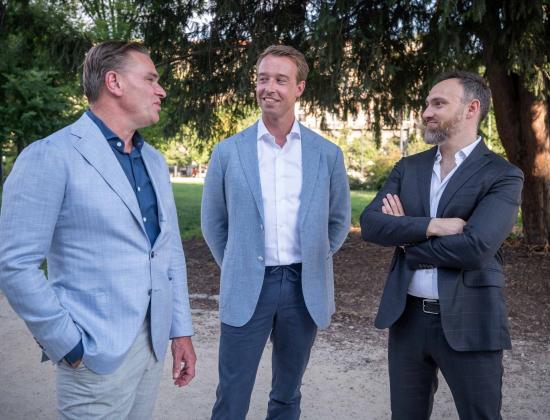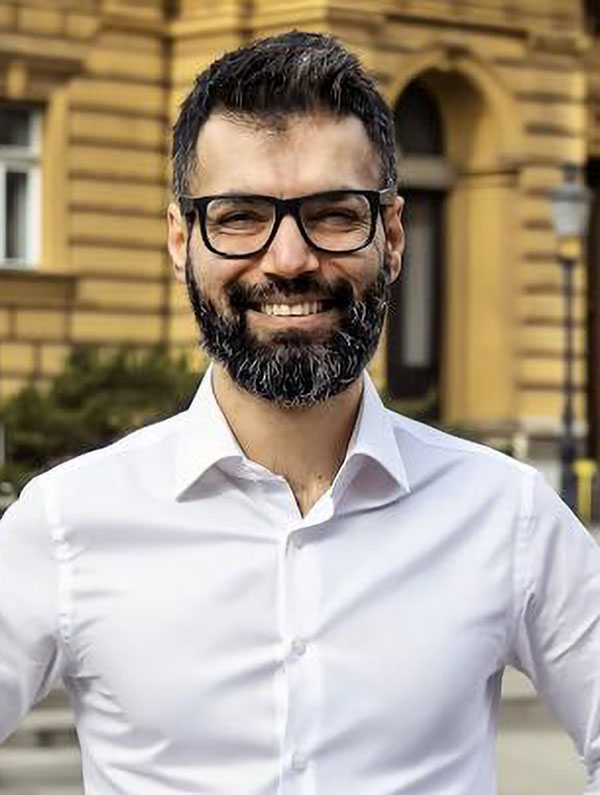
Foto: Legendland
Today for Poslovni savjetnik we have the opportunity to speak with Hesam Qaydi, the visionary behind the ambitious Legendland project. This initiative has sparked interest not only for its innovative concept but also for the way it seeks to integrate with and impact the local community where it is planned to be developed.
Hesam Qaydi comes from a strong background in business development and creative project management, with academic training that combines both technical knowledge and entrepreneurial expertise. Over the years, he has been involved in multiple ventures across different sectors, focusing on innovative solutions, community-oriented projects, and long-term sustainable growth. His track record demonstrates a commitment to bridging bold ideas with practical execution. In this conversation, we aim to understand the challenges the project faces, the reactions from local stakeholders, and the strategies Hesam has in mind to ensure both community acceptance and long-term success.
Community acceptance
Udruga.hr: How has the local community reacted so far to the Legendland project?
We all know that Disney or any other big corporation will not come to Croatia anytime soon. If we wait for them, we will wait forever. That’s why we started with the local community — because if Croatian families don’t believe in this project, then nobody else will. And families have already proven their belief. In the very beginning, before the project even officially started, more than 340 families joined, representing over €250,000 – €300,000 in reservations. This has never happened before in Croatia.
We’ve already received more than 80 job applications from Croatians who want to work in LegendLand — and most of them already have jobs. That shows the level of excitement and passion behind this project.
On top of that, over 20 local producers have applied for space to be included in the master plan, whether for kiosks or indoor areas. Independent research by Valicon confirms that the support is real: up to 889,000 Croatians aged 18–55 — almost one-third of the market — say they would consider buying a lifetime membership if the project is feasible. Families don’t want to keep traveling abroad; they want something here, in Croatia.
Udruga.hr: What steps have you taken to include residents in the planning process?
From the start, we designed LegendLand as a community-driven project. Families can join as micro-investors through Lifetime Membership reservations. These memberships give them unlimited VIP access forever, and more importantly, their names and personal messages will be engraved on the Founders’ Wall at the park entrance. This way, they don’t just consume the park later — they shape it now.
Udruga.hr: Do you see any cultural or social concerns from locals that you need to address?
Of course, there is natural skepticism. People say: “Croatia is too small. This is impossible. It’s too good to be true.” I understand why they feel that way. Croatia is a nation that has been through a lot, carrying old wounds and disappointments from projects that never happened. That is why we built LegendLand differently. Reservations are free until the project officially starts — families risk nothing, but they still become part of the story. We share progress openly, we publish research, and we let people decide for themselves. This transparency is how we turn mistrust into trust.
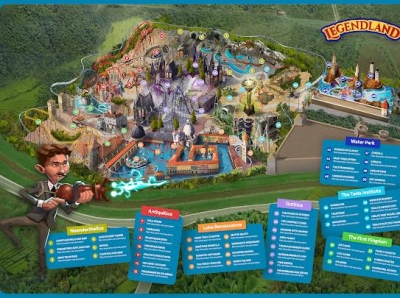
Udruga.hr: How do you plan to build trust with community members who may be skeptical?
Through openness, proof, and fairness. The numbers already show it: over 340 families joined at the very beginning, with more than €250,000 – €300,000 in reservations. But most importantly, we designed the model so that families risk nothing. We don’t take any payments until the project officially begins. And when payments do start, families can spread them across 24 installments, making it affordable for almost everyone. This also adds security. Scams usually take all the money at once and then disappear. Our model does the opposite — payments happen gradually, and families can monitor progress every month. It’s transparent, safe, and designed to build trust step by step.
Udruga.hr: What role do you see the local community playing once the project is operational?
The community will be more than visitors. They will be employees, suppliers, cultural contributors, and storytellers. LegendLand will celebrate both our sport champions and our cultural figures — singers, writers, innovators, anyone who contributed to Croatia’s wellbeing and future. Imagine Olympic champions in water sports inspiring the water park zone, or Nikola Tesla’s inventions powering the thrill rides. This way, the park becomes a living monument to Croatia’s legends, built together with the community.
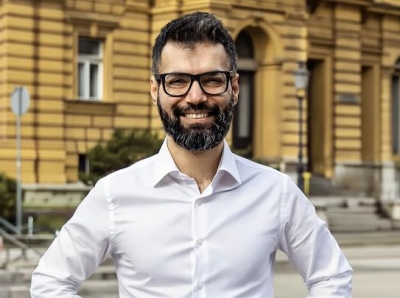
Problems and challenges
Udruga.hr: What have been the biggest obstacles so far in moving the project forward?
We are facing a classic chicken-and-egg problem. Municipalities and the ministry will not suggest concrete land for the project until they see a major investor enrolled. But major investors will not commit until land is secured with municipal backing. In addition, Croatia’s economic incentives currently stop at €50M + €25M. For projects over €1B, the government must define what support exists. We believe the way to break this closed loop is through Lifetime Membership reservations. By showing that hundreds of families are ready to join already, and that millions in revenue can be secured years in advance, we create the proof that both government and major investors are waiting for.
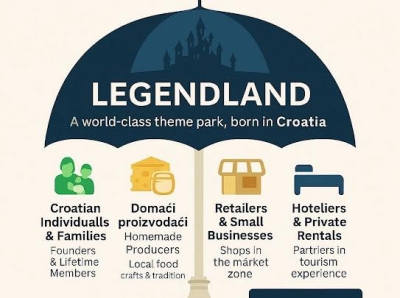
Udruga.hr: Are there specific regulatory or governmental challenges you’ve encountered?
Yes. Four towns near Zagreb — Zaprešić, Jastrebarsko, Dugo Selo, and Bjelovar — have already shown interest in hosting LegendLand. But until there is clear governmental backing and incentives, no location of around 100 hectares will be made available. The obstacles are clear: uncertainty about urban plan adjustments if we identify potential land, lack of communication and clear guidelines from the Ministry of Physical Planning, absence of financial incentives from the Ministry of Economy and Sustainable Development for projects over €1B, and no investment visa framework for non-EU residents. Let’s be direct: if Croatia can already issue thousands of work permits every year to cover labor shortages, then it can certainly issue 1,000–2,000 investment visas to bring in capital for a project that will create thousands of domestic jobs. It is a matter of priorities.
Udruga.hr: How do environmental concerns factor into the development process?
Sustainability is central to LegendLand. We look at successful benchmarks like PortAventura in Spain, which achieved carbon neutrality for its direct operations, uses 100% renewable electricity, and screens suppliers for sustainability. For LegendLand, our commitments are clear: 100% renewable electricity from day one, a zero single-use plastic policy, and a biodiversity protection plan for every hectare we use. The goal is to create not just a theme park, but a model of sustainable tourism and cultural heritage.
Udruga.hr: What kinds of resistance — social, political, or economic — have you noticed, and how are you handling it?
Social resistance comes from skepticism. We address this with transparency and social proof. Families who already joined send us their videos and messages, which we publish publicly, inviting others to join them. Nothing builds trust like real people standing behind the project. Political resistance is, in fact, a consequence of social resistance. The government is waiting to see how many people will stand for the project. Once we break through the market and the community shows clear support, political support will follow. Economic resistance comes from doubts about purchasing power. But we address this with our Lifetime Pass Membership model. Families can pay in 24 installments with a discount — in practice, most families can afford €10–15 per month for a world-class theme park membership that lasts forever. This turns what looks like an impossible dream into something accessible and realistic for almost everyone.
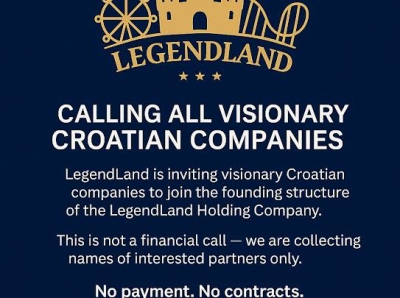
Udruga.hr: How do you balance the project’s vision with the realities on the ground in the location?
The vision is to build a world-class theme park. The reality on the ground is that Croatia is a small market with relatively low purchasing power. But what others see as challenges, we see as opportunities. Zagreb itself and the surrounding area represent a market of around 1 million people. Within a two-hour driving distance, we reach up to 3–4 million people. And within a six to eight-hour drive, the catchment expands to more than 50 million people across Italy, Austria, Germany, Hungary, and the wider Central European region. That is a powerful location advantage.
Our strategy is simple: Phase 1: Families. Phase 2: Companies. Phase 3: Global investors and IPO. In other words, we don’t ignore the challenges — we embrace them, and we turn them into opportunities for sustainable growth.
Business Solutions and Strategic Plans
Udruga.hr: What unique business strategies are you implementing to overcome these challenges?
Many people confuse what we are doing with simply selling tickets in advance for a park that doesn’t exist. That is not the case. We are not pre-selling tickets — we are inviting families and companies into a partnership. For families, this means Lifetime Memberships: unlimited VIP access forever, transferable across generations, not just a product but a family legacy. For companies, this means joining the LegendLand holding company, sharing in the vision and long-term growth. At this stage, the risk is zero because reservations are free until the project officially begins. But even now, this sends a strong signal to investors and the government: the community is ready, demand exists, and the project is profitable years in advance.
Udruga.hr: How do you plan to make Legendland economically beneficial not just for investors but also for the local population?
The project will create thousands of jobs directly and indirectly, strengthen the tourism sector, and provide an additional reason for people to visit Croatia. Local suppliers, hotels, restaurants, and cultural institutions will all benefit. And the impact on the local economy is significant. According to our project consultant, Mr. Michael Collins of LDP, who also serves on the Global Board of Directors of IAAPA, a conservative multiplier is at least 1.5 times the park’s revenues being spent in the local economy every single year. That means LegendLand is not just an entertainment project — it’s a long-term economic engine for Croatia.
And there’s another point: The VALICON research shows that 72% of Croatians aged 18–55 have already visited an amusement park, with 43% going to Gardaland. This proves the demand exists — families are already willing to travel and pay for these experiences, just not in Croatia. LegendLand would keep that demand at home and add a new reason for tourists to come here.
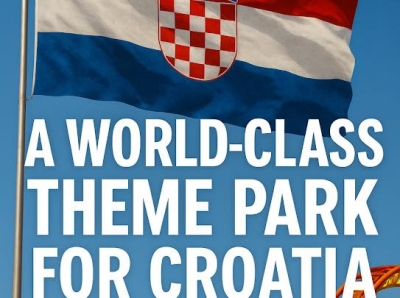
Udruga.hr: What innovative solutions are you bringing to ensure the project is sustainable in the long term?
Our model is a blend of three innovations:
Lifetime Memberships → They don’t just finance the initial phase of the project and remove the major obstacles — they also guarantee future visitor attendance and spending for generations. Once a family joins, they are connected to the park forever.
Cultural IP → Croatian myths, legends, and living figures create a unique brand that cannot be copied elsewhere.
Sustainability commitment → 100% renewable electricity from day one, zero single-use plastics, and biodiversity protection will set new standards for Croatian tourism.
And importantly, we designed the business model to be balanced. Not all visitors will have Lifetime Memberships — and that is by design. According to our business plan, it is enough for 10–20% of the market to join in Phase 1. The rest of the local market, together with millions of tourists, will buy daily tickets priced between €60 and €90 per person per day. This combination ensures that LegendLand is not only launched successfully but remains relevant, profitable, and sustainable for decades to come.
Udruga.hr: How are you adapting the project’s design or concept to fit the local context better?
By celebrating what Croatia is strongest in: sports and culture. Our champions in sport are recognized worldwide, and our cultural legends — from Nikola Tesla to great artists and musicians — are part of global heritage. LegendLand will combine these, creating something deeply Croatian but attractive worldwide. And just as some parks have Ferrari Land, LegendLand can feature a zone dedicated to Croatian companies — for example, a car producer or another flagship industry. This will showcase to the world what Croatian companies are capable of, blending entertainment with national branding. It’s not only fun, it’s also a live showroom of Croatia’s innovation and potential.
We also want to extend an open invitation: if any Croatian champion, singer, writer, or public figure would like to become part of our concept design, they are welcome. This project is built for Croatia, and with Croatia — and every person who has contributed to its culture, sport, or future has a place in it.
Udruga.hr: Looking ahead, what partnerships or collaborations do you see as crucial for Legendland’s success?
We believe in open collaboration. Here we invite all Croatian entrepreneurs and companies to join the LegendLand holding company. The door is open for everyone who believes in this vision. Together, we can build a project that will belong to all of Croatia. Partnerships with municipalities, government, cultural institutions, and the business sector will be fundamental. Once this support is visible, major international investors will follow. If we don’t do it, nobody will. Our children deserve better — and together, we will make it happen. We should not have to take our children to another country for a theme park. It is time for Croatia to step onto the global stage in tourism. Beautiful coasts and islands are not enough anymore. To truly compete, we must break this chicken-and-egg problem and create something extraordinary here at home. (ps/sm)
For Business Media Group (BMG) media issues Goran Jungvirth, journalist

